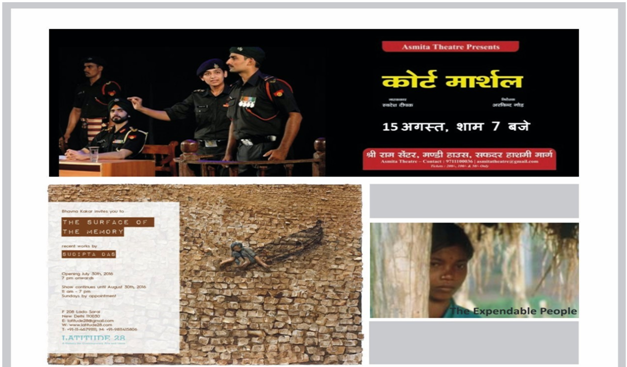Peace of Art

Blue skies, no more, red roses, no more; dust, sand and marshlands, battles, hate and lies. Ghosts, jokers, Pokémon, caricatures, creatures, crimes. When you say this word, someone else, somewhere else says it at the same time – surges of love, loathing and liberation. Many who speak, still wait to be heard, buried they lie under political prisons, pellets and animosity. This world which fights radicalism with radicalism, gore with gore, sets one apart from the other, faint lines becoming darker, segregating us, building hate, destroying love. The colour of your skin, your religious identity, the people you talk to, your abode, the town you live in, your work, isolating you, smothering you under a spell, stifling your humanity. Then comes a torrent of evil, in forms of war, crusades and bullets, taking lives, leaving unheard voices of hate, only heard to exterminate.
The rains come once again, washing away the old, parched and arid. The weather brings chaos, thunder and parcels of paint, performances and radiant passages of prose and portrait. The Surface of the Memory is an ongoing Art Exhibition at Latitude 28, in New Delhi, presented by gallery director, Bhavna Kakar, showcasing recent works by artist Sudipta Das, her works achieving crucial relevance in today’s unsettling times. Das paints images of the past and the present, depicting her own identity as a fourth generation Bangladeshi migrant in India. The unending voyages of the dispossessed across cultural and political boundaries in human history serve as a vast backdrop for her artistic pursuit.
Peace, love and belonging become the precursors to a life of happiness and dignity, directed by Tapan Bose, The Expendable People, a film, makes a passionate appeal for justice for the Adivasi, the tribal people of India, often cheated and criminalized in their forest homes. The film documents their lives, using rare archival footage and interviews with a renowned anthropologist, and Adivasi activists from the 80s and 90s.
Socio-political relevant performance art pieces communicate a deep emotional message about the problems plaguing a society. Asmita Theatre group brings forth many such issues to light through its theatre workshops and plays in Delhi. Unsuni is one such theatrical production, it talks about how not all sections of the society are treated equally and given equal rights, the socially underprivileged getting marginalised. Amritsar Aa Gaya, Operation Three Star, A Woman Alone, Ramkali and Court Martial are a few other socially relevant plays by Asmita. Court Martial, to be staged recently, talks about how being identified as a person belonging to a low caste often becomes a source of traumatization, leading to injustice, an offence that takes larger proportions as a crime against humanity and society at large.
People around the world are expressing themselves through indirect voices of paint, action and drama. As the world becomes populated with stories of injustice, crime and brutalities, many are finding a comfortable source through various forms of art to voice their opinions and trace their thoughts. The stage, the canvas, the screen, becoming platforms of that desirable change, the laboured voice, the lost soul.
Events:
An Art Exhibition: The Surface Of The Memory, Paintings by Sudipta Das, at Lattitude 28 gallery, Lado Sarai, New Delhi, on till 30th August 2016.
A Film: The Expendable People, by Tapan Bose, at India International Centre, Max Mueller Marg, New Delhi, on the 9th of August at 6:30pm, followed by a discussion.
A Play: Court Martial, a Hindi Play by Asmita Theatre, at Sri Ram Centre, Mandi House, New Delhi, on the 15th of August 2016.



